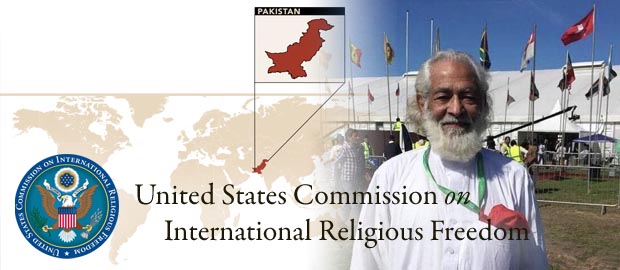
WASHINGTON, D.C. – The U.S. Commission on International Religious Freedom (USCIRF) has strongly condemned the arrest, detention, and sentencing of Abul Shakoor, an 80-year-old optician, for propagating the Ahmadiyya Muslim faith, which is banned in Pakistan.
On December 2, 2015, Mr. Shakoor was charged with propagating the Ahmadiyya Muslim faith, a crime under the Pakistani Penal Code, and stirring up “religious hatred” and “sectarianism,” a crime under the 1997 Anti-Terrorism Act. Mr. Shakoor was arrested in his optical store after he was falsely accused of selling an Ahmadiyya commentary on the Holy Qur’an, among other publications, to an undercover police officer. On January 2, 2016, he was sentenced to five years’ imprisonment under Penal Code Section 298C and three years under the Anti-Terrorism Act, with the sentences to run concurrently. His store manager Mazhar Sipra, a Shi’a, also was arrested and sentenced to five years under the Anti-Terrorism Act.
USCIRF Chairman Robert P. George said, “USCIRF calls on the Pakistani government to immediately release Mr. Shakoor and drop all charges against him. His arrest and sentencing are outrageous enough, but more egregious is the fact that Pakistani constitutional and penal code provisions prevent Ahmadis from exercising their faith and even calling themselves Muslim, and that the country uses anti-terrorism laws as pretexts for denying peaceful citizens the fundamental human right to religious freedom.”
Ahmadis in Pakistan are subject to severe legal restrictions, both in the constitution and criminal code, and suffer from officially-sanctioned discrimination. Ahmadis also continue to be murdered in religiously-motivated attacks that take place with impunity. Pakistan’s constitution declares Ahmadis to be “non-Muslims,” and the penal code make it criminal for Ahmadis to refer to themselves as Muslims; preach, propagate, or disseminate materials on their faith; or refer to their houses of worship as mosques.
“The arrest and sentencing of Mr. Shakoor is another example of Pakistan’s systematic, ongoing, and egregious violations of freedom of religion or belief,” said Chairman George. “Both Mr. Shakoor and Mr. Sipra should be released immediately and all charges dropped. Furthermore, it is the duty of the Pakistani government to ensure the safety of both men. Members of Pakistan’s Ahmadiyya community, as well as Shi’a Muslims, Christians, Hindus and others, deserve to have their basic human right to religious freedom both respected and protected by their government.”
USCIRF since 2002 has recommended that Pakistan be named a “country of particular concern” (CPC) by the State Department under the U.S. International Religious Freedom Act for its “systematic, ongoing and egregious” violations of religious freedom. For more information on religious freedom conditions in Pakistan and for recommendations for U.S. policy, please see USCIRF’s 2015 Annual Report chapter on Pakistan here.
